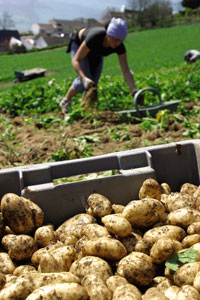Canadian experience highlights danger of potato disease

New disease threats have the potential to completely ruin farm businesses, Keith Kuhl, a potato farmer from Southern Manitoba, Canada, told the Potato Council’s recent seed potato conference.
Outlining how 53,000t of Alberta seed potatoes worth over £11m were dumped in 2008 because of two subsequently unproven detections of potato cyst nematode on farms in the province, he said communication between industry and government was vital in a crisis.
After the initial inconclusive findings were announced, all exports of seed potatoes from Alberta were temporarily banned until a survey had been conducted to establish the boundaries of the area infested were found, he explained.
But as all fields were frozen until the spring it was impossible to conduct that survey until after the export market for the previous year’s crop was lost.
Poor communication between government and the industry contributed to the losses, he said.
A knee-jerk reaction by the US and Canadian governments to a previous finding of PCN in Idaho and Quebec in 2006 to put in place phytosanitary guidelines without consultation with industry had resulted in measures that were insufficient to manage the later suspect samples, he explained.
Subsequent decisions to close the border to exports to USA were then made more on emotion than science or logic, he suggested.
“Communication between regulatory agencies and industry must be a top priority when there is a crisis, and all players must be part of the consultation process to prevent the devastation of a viable industry,” he stressed.

